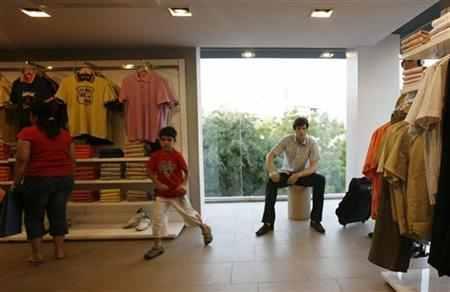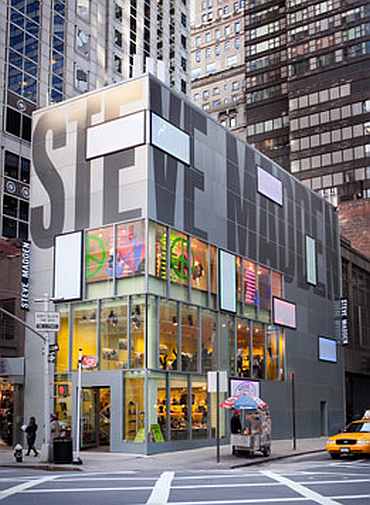Photographs: Desmond Boylan/Reuters Raghavendra Kamath in Mumbai
Reliance Brands has announced a new venture every month this year, starting from a tie-up with New York-based fashion brand Iconix (which has over 20 brands) in February to sportswear retailer Quicksilver in August. The subsidiary of Reliance Industries has entered into joint ventures or distribution agreements with a dozen global brands already.
Yet, Darshan Mehta, the 51-year-old CEO of Reliance Brands, says: "We are not in a hurry".
He surely doesn't mean it. Mehta, who loves to give analogies from the luxury car market to drive home his point, says he is aware of the segmentation within the luxury market. "You have BMW 5 series and Mercedes E Class in Rs 25 lakh-50 lakh price bracket; Porsche 911 and Audi Q7 in Rs 50 lakh-1 crore range and Aston Martin D89 and Ferrari Fiorano above Rs 1 crore," Mehta says.
...
How Reliance is straddling the luxury pyramid
Image: Reliance Brands has stores under Quicksilver.Photographs: Courtesy, Quicksilver
Reliance Brands also has three levels of positioning. In luxury, it has Ermenegildo Zegna and Paul & Shark where the median price point is Rs 15,000 and above.
In 'affordable luxury where the median price is Rs 8,000 to Rs 10,000, it offers Diesel Jeans or Thomas Pink shirt. And the third segment is high-premium, where Reliance Brands has stores under Quicksilver, Timberland and others.
"If anyone has a budget of Rs 1 lakh for a bag and has to chose between a Tarun Tahiliani and Gucci, he would definitely go for the latter. More and more customers are aspiring for international brands. They are our targets." Mehta says, sitting in his eighth floor office in Cuffe Parade, overlooking the Arabian Sea.
...
How Reliance is straddling the luxury pyramid
Photographs: Danish Siddiqui/Reuters
Mehta has a point. According to a CII-AT Kearney report, the Indian luxury market is worth over Rs 30,000 crore (Rs 300 billion) and is expected to reach over Rs 80,000 crore (Rs 800 billion) in 2015.
Between 2010 and 2011, the market has grown 20 per cent. The number of ultra high net-worth households, or households with a minimum net worth of Rs 25 crore (Rs 250 million), is expected to triple to over 200,000 and their net worth is expected to grow five times by FY 2015-16, according to a report by Kotak Wealth and CRISIL Research.
The 'portfolio of brands strategy' followed by companies such as Reliance Brands, Genesis Colors and DLF Brands among others offers them many synergies, says Nilesh Hundekari, head, Luxury & Lifestyle practice, AT Kearney, a global management consultancy.
...
How Reliance is straddling the luxury pyramid
Image: Reliance Brands has stores of Diesel, Paul & Shark, Steve Madden and Timberland.Photographs: Courtesy, stevemadden.com
"When you have multiple brands, you can buy space in bulk and divide them between brands you have. The bargaining power of a company booking 10,000 square feet will be much better than a brand which is booking 2000 sq ft," says Hundekari.
Reliance Brands has stores of Diesel, Paul & Shark, Steve Madden and Timberland at the Palladium luxury mall in Lower Parel.
Though the luxury market is emerging, experts say Reliance Brands does not have much competition now, barring Genesis Colors and L Capital, the private equity capital arm of French luxury powerhouse LVMH.
...
How Reliance is straddling the luxury pyramid
Photographs: Alessia Pierdomenico/Reuters
"There are no other companies that target consumers in the space that Reliance Brands does, except Genesis Colours and maybe L Capital which will probably be a lead player bringing in international brands. I expect that there will be a consistent churn in these portfolios as not everything will find traction in the indian market," says Jaydeep Shetty, chief executive, Mineral Fashio, a Mumbai-based fashion chain.
But bringing brands is one thing and running them is an altogether different thing when economy is down. Economic slowdown has forced companies such as DLF Brands, which retails Mango and Boggi, to advance its sales to reduce inventory pile ups and release capital.
Many global and international brands started their discounted sales in the last week of June, two or three weeks ahead of their normal time.
...
How Reliance is straddling the luxury pyramid
Photographs: Robert Galbraith/Reuters
But Mehta says he hasn't felt any impact till now. "For the period between January and July 2012, we are ahead of our budgets. We have not extended our sale by a day, though we can get impacted in the future," he adds.
Hundekari of AT Kearney believes that luxury was almost insulated even during the 2008-09 slowdown. "The reason is that a big part of the growth comes from opening new stores and not by same store sales growth," he adds.
Given that Reliance Brands has incurred losses of Rs 18.07 crore (Rs 180.7 million) in 2011-12, when does Mehta think the company will break even? "The day we stop growing, we will be profitable. Every baby (brands) needs time to grow. This is a long gestation business and needs deep pockets to grow," is what he has to say.
...
How Reliance is straddling the luxury pyramid
Photographs: Finbarr O'Reilly/Reuters
However, Mehta knows he and his team has to work hard to sell, as fashion is part of discretionary spending. That's more so when you have to hawk jeans that cost over Rs 13,000.
That's why the company is holding something called 'Trunk Shows' and Home Shopping in tier II and III cities to increase reach. For a 'Trunk Show', the company books an art gallery or a banquet hall in a city and sets up a mini-store of a brand for three to four days.
Reliance has already done this with four of its brands including Paul & Shark, Diesel, Ermenegildo Zegna and eventually plans to cover all the 12 brands and do this in 18 to 20 cities.
...
How Reliance is straddling the luxury pyramid
Photographs: Eric Thayer/Reuters
"It is not commercially viable as yet for a retailer to set up these stores in tier II and IIl cities and keep them open for 365 days. With Trunk shows, we aim to tap the rich in these cities," says Deval Shah, project head, Reliance Brands.
In 'Home shopping', the company appoints 'champions' who take appointments of people in small cities, and visit their homes, display merchandise and take orders. The company is also working on separate e-commerce sites for all its brands to tap consumers from there.
Contrary to all his protestations, Mehta is indeed in a hurry.










article